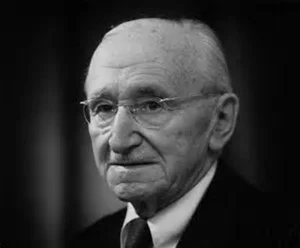“The curious task of economics is to demonstrate to men how little they really know about what they imagine they can design” — Austrian economist, political philosopher and Nobel laureate F.A. Hayek, in “The Fatal Conceit.”
Read MoreChodorov on History
"The imperviousness of economic law to political law is shown in this historic fact: In the long run every State collapses, frequently disappears altogether and becomes an archeological curio—every collapse of which we have ancient evidence was preceded by the same course of events. The State, in its insatiable lust for power, increasingly intensified its encroachments on the economy of the nation, causing a consequent decline of interest in production, until at long last the subsistence level was reached and not enough above that was produced to maintain the State in the condition to which it had been accustomed. It was not economically able to meet the strain of some immediate circumstance like war, and succumbed. Preceding that event, the economy of Society, on which State power rests, had deteriorated, and with that deterioration came a letdown in moral and cultural values; men 'did not care.’ That is, Society collapsed and drew the State down with it" — from Chapter One: Economics Versus Politics in libertarian thinker Frank Chodorov's The Rise and Fall of Society.
Read MoreLewis on Tyranny
Of all tyrannies a tyranny sincerely exercised for the good of its victims may be the most oppressive. It may be better to live under robber barons than under omnipotent moral busybodies. The robber baron's cruelty may sometimes sleep, his cupidity may at some point be satiated; but those who torment us for our own good will torment us without end for they do so with the approval of their own conscience. They may be more likely to go to Heaven yet at the same time likelier to make a Hell of earth. This very kindness stings with intolerable insult. To be "cured" against one's will and cured of states which we may not regard as disease is to be put on a level of those who have not yet reached the age of reason or those who never will; to be classed with infants, imbeciles, and domestic animals” — philosopher and theologian C. S. Lewis in “The Humanitarian Theory of Punishment" (1949).
Read More
Friedman on Equality
“The society that puts equality before freedom will end up with neither. The society that puts freedom before equality will end up with a great measure of both” — economist Milton Friedman in the PBS series, Free to Choose, based on his book of the same title.
Read MoreBastiat on Socialism
“Socialism, like the ancient ideas from which it springs, confuses the distinction between government and society. As a result of this, every time we object to a thing being done by government, the socialists conclude that we object to its being done at all. We disapprove of state education. Then the socialists say that we are opposed to any education. We object to a state religion. Then the socialists say that we want no religion at all. We object to a state-enforced equality. Then they say that we are against equality. And so on, and so on. It is as if the socialists were to accuse us of not wanting persons to eat because we do not want the state to raise grain” — French economist and statesman Frederic Bastiat in “The Law.”
Read MoreRand on force vs persuasion
“There are only two means by which men can deal with one another: guns or logic. Force or persuasion. Those who know that they cannot win by means of logic, have always resorted to guns” — Ayn Rand in “Philosophy: Who Needs It.”
Read MoreMencken on FDR
“[Roosevelt] was always... finding new victims to loot and new followers to reward, flouting common sense, and boldly denying its existence, demonstrating by his anti-logic that two and two made five, promising larger and larger slices of the moon. His career will greatly engage historians, if any good ones ever appear in America, but it will be of even more interest to psychologists. He was the first American to penetrate to the real depths of vulgar stupidity. He never made the mistake of overestimating the intelligence of the American mob. He was its unparalleled professor” — journalist H. L. Mencken, April 1945.
Read MoreGatto on Government Schools
“I've noticed a fascinating phenomenon in my thirty years of teaching: schools and schooling are increasingly irrelevant to the great enterprises of the planet. No one believes anymore that scientists are trained in science classes or politicians in civics classes or poets in English classes. The truth is that schools don't really teach anything except how to obey orders. This is a great mystery to me because thousands of humane, caring people work in schools as teachers and aides and administrators, but the abstract logic of the institution overwhelms their individual contributions. Although teachers to care and do work very, very hard, the institution is psychopathic. It has no conscience. It rings a bell and the young man in the middle of writing a poem must close his notebook and move to a different cell where he must memorize that humans and monkeys derive from a common ancestor” ― educator John Taylor Gatto, author of Dumbing Us Down: The Hidden Curriculum of Compulsory Schooling.
Read MoreBastiat on the Law
“Life, liberty, and property do not exist because men have made laws. On the contrary, it was the fact that life, liberty, and property existed beforehand that caused men to make laws in the first place…It is impossible to introduce into society a greater change and a greater evil than this: the conversion of the law into an instrument of plunder…When law and morality contradict each other, the citizen has the cruel alternative of either losing his moral sense or losing his respect for the law” — French economist and statesman Frederic Bastiat in his classic, must-read book, “The Law,” available at FEE.org.
Read MoreDurant on History
"Perhaps the cause of our contemporary pessimism is our tendency to view history as a turbulent stream of conflicts—between individuals in economic life, between groups in politics, between creeds in religion, between states in war. This is the more dramatic side of history; it captures the eye of the historian and the interest of the reader. But if we turn from that Mississippi of strife, hot with hate and dark with blood, to look upon the banks of the stream, we find quieter but more inspiring scenes: women rearing children, men building homes, peasants drawing food from the soil, artisans making the conveniences of life, statesmen sometimes organizing peace instead of war, teachers forming savages into citizens, musicians taming our hearts with harmony and rhythm, scientists patiently accumulating knowledge, philosophers groping for truth, saints suggesting the wisdom of love. History has been too often a picture of the bloody stream. The history of civilization is a record of what happened on the banks” — historian Will Durant.
Read MoreReed on Socialism is Like Fishing
Fishing is one of my favorite hobbies, though it bears strong similarities to socialism: First, you offer something for nothing to the gullible and unsuspecting. Then you hook ‘em. Then you reel them in. Then you eat ‘em.
Read More



















